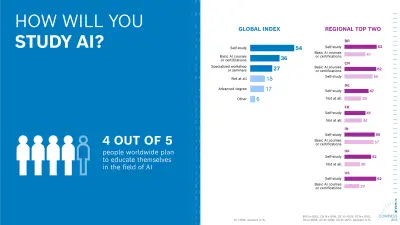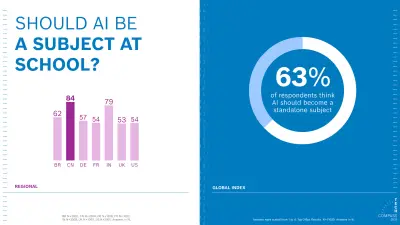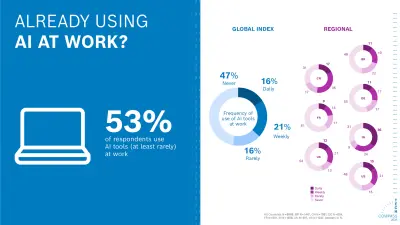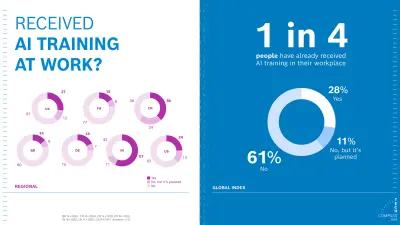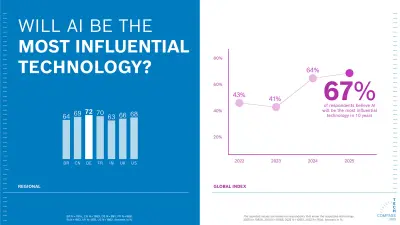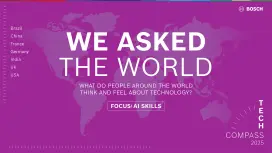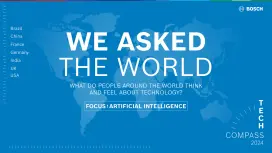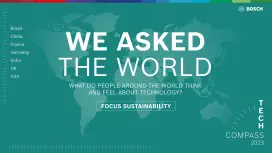Do we have the AI skills we need for the future?
A representative survey in Brazil, China, France, Germany, India, the UK, and the USA about technology with a focus on AI skills.

Artificial Intelligence (AI) opens up countless opportunities. But how can we use this technology to become more productive, efficient, and successful? And do we have the AI skills needed to achieve this? In a representative survey conducted in Brazil, China, France, Germany, India, the UK, and the USA, we explored these questions.
Key messages explored in the study
How important will AI skills be in the future?
AI skills are becoming increasingly relevant: 71% of people worldwide consider them crucial to future success. This view is particularly prevalent in China (91%) and India (89%), while Western countries such as Germany (60%) and France (56%) rate the relevance of AI skills lower.
How important are AI skills in the workplace already?
56% of respondents worldwide say that AI skills are essential or important in their current job. Employees in India (83%) and China (76%) in particular see a high level of importance. In Western countries such as Germany (41%) and France (38%), the percentage is significantly lower.
What skills are most important in the age of AI?
The effective use of AI tools (59%) is considered the most important skill worldwide, followed by critical thinking (44%) and an awareness of cybersecurity (44%). Interestingly, in the UK, critical thinking (50%) is considered more important than the effective use of AI (49%).
82%
of people worldwide plan to educate themselves about AI — with particularly high interest in emerging countries like India (98%) and China (95%).
AI skills: How people worldwide are taking their future into their own hands

The Bosch Tech Compass 2025 highlights how people globally recognize the importance of education in artificial intelligence. Four out of five respondents plan to actively educate themselves to better understand and apply AI. Self-study plays a central role (54%). Motivation is particularly high in India (98%), China (95%), and Brazil (92%).
AI is also gaining importance in school education: 63% of respondents worldwide support introducing AI as an independent subject in school curricula. The findings show that education and continuous development are key to fully leveraging the opportunities of an AI-driven future.
AI training in the workplace: How many employees have already been trained?
Artificial intelligence is making its way into the working world, but how prepared are we? According to the Tech Compass, one in four respondents worldwide (28%) has already completed AI training at work, with 11% planning to do so. India leads with 57% of respondents trained in AI, while Germany (18%) and France (15%) show significantly lower rates. The data highlights how AI is transforming the workplace and creating new demands for companies and employees.

AI: Here to stay?

Artificial intelligence is not a fleeting trend but an increasingly influential technology. The Bosch Tech Compass 2025 reveals that 67% of respondents worldwide see AI as the most important technology for the years ahead — a significant rise from 2024 (64%) and especially from 2023 (41%). In Germany, 72% view AI as pivotal for the future, ahead of France (70%), China (69 %), and the USA (68%). Concerns about AI are diminishing: 43% attribute a positive societal impact to AI (2024: 39%). At the same time, the perception of potential negative effects has decreased globally to 34% (2024: 38%). In countries like Germany (43%, 2024: 51%) and the USA (40%, 2024: 50%), skepticism about AI is steadily waning.

AI skills are no longer limited to experts. With education we can harness AI to enhance everyone’s abilities, validate AI outcomes, and ultimately improve human-machine collaboration.
Key facts
Study design

As part of this study, people aged 18 and over from seven countries (Brazil, China, France, Germany, India, the UK, and the USA) were surveyed online in October 2024 by the Gesellschaft für Innovative Marktforschung mbH (GIM) on behalf of Robert Bosch GmbH.
In France, Germany, and the UK, at least 1,000 participants were surveyed, while in Brazil, China, India, and the USA the sample size was at least 2,000. The selection of participants is representative of each country in terms of region, gender, and age (BR, DE, FR, UK, US: 18–69 years / CN, IN: 18–59 years).
Contact partner
Matthias Jekosch
Spokesperson for Research and Advanced Development, Artificial Intelligence, and Start-ups
The global results (“global index¨) are based on an average across all seven countries, without taking population size into account. Unless otherwise specified, the values are presented using the Top 2 box method. For better readability and simplified interpretation, the global index for 2023/2024/2025, each based on seven countries, is occasionally compared to the index from 2022, which was based on five countries. Calculating a global index for 2023/2024/2025 using the five countries from the previous year yielded comparable results.
